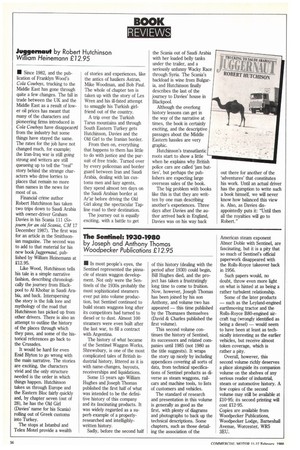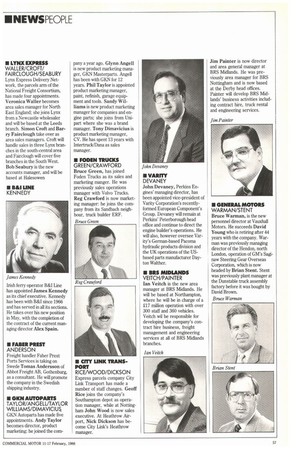BOOK REVIEWS
Page 66

Page 67

If you've noticed an error in this article please click here to report it so we can fix it.
• Since 1982, and the publication of Franklyn Wood's Cola Cowboys, trucking to the Middle East has gone through quite a few changes. The fall in trade between the UK and the Middle East as a result of lower oil prices has meant that many of the characters and pioneering firms introduced in Cola Cowboys have disappeared from the industry but some things have stayed the same. The rates for the job have not changed much, for example; the Iran-Iraq war is still going strong and writers are still queueing up to tell the "real" story behind the strange characters who drive lorries to places that remain no more than names in the news for most of us.
Financial crime author Robert Hutchinson has taken two trips down to Saudi Arabia with owner-driver Graham Davies in his Scania 111 (Sojourn for an old Scania, CM 17 December 1987). The first was for an article in the Smithsonian magazine. The second was to add to that material for his new book Juggernaut, published by William Heinemann at 212.95.
Like Wood, Hutchinson tells his tale in a simple narrative fashion, describing chronologically the journey from Blackpool to Al Ithobar in Saudi Arabia, and back. Interspersing the story is the folk lore and mythology of the road that Hutchinson has picked up from other drivers. There is also an attempt to outline the history of the places through which they pass, and some of the historical references go back to the Crusades.
It would be hard for even Enid Blyton to go wrong with the main narrative. The stories are exciting, the characters vivid and the only structure needed is the order in which things happen. Hutchinson takes us through Europe and the Eastern Bloc fairly quickly and, by chapter seven (out of 28), he has the Old Girl (Davies' name for his Scania) rolling out of Greek customs into Turkey.
The stops at Istanbul and Telex Motel provide a wealth of stories and experiences, like the antics of hauliers Astran, Mike Woodman, and Bob Paul. The whole of chapter ten is taken up with the story of Les Wren and his ill-fated attempt to smuggle his Turkish girlfriend out of the country.
A trip over the Turkish Tarus mountains and through South Eastern Turkey gets Hutchinson, Davies and the Old Girl to the Iranian border.
From then on, everything that happens to them has little to do with justice and the pursuit of free trade. Turned over by every policeman and border guard between Iran and Saudi Arabia, dealing with lax customs men and lazy agents, they spend almost ten days on the Saudi Arabian border at Afar before driving the Old Girl along the spectacular Tapline road to their destination.
The journey out is equally exciting, with a battle to get /1 In most people's eyes, the Sentinel represented the pinnacle of steam waggon development. Not only were the Sentinels of the 1930s probably the most sophisticated steamers ever put into volume production, but Sentinel continued to build steam waggons long after its competitors had turned to diesel or to dust. Almost 100 steamers were even built after the last war, to fill a contract with Argentina.
The history of what became of the Sentinel Waggon Works, Shrewsbury, is one of the most complicated tales of British industrial history, littered as it is with name-changes, buyouts, receiverships and liquidations.
Some 15 years ago William Hughes and Joseph Thomas published the first half of what was intended to be the definitive history of this company and its fascinating products. It was widely regarded as a superb example of a properlyresearched and intelligiblywritten history.
Sadly, before the second half the Scania out of Saudi Arabia with her loaded belly tanks under the trailer, and a seriously unfunny Wacky Race through Syria. The Scania's backload is wine from Bulgaria, and Hutchinson finally describes the last of the journey to Davies' house in Blackpool.
Although the overlong history lessons can get in the way of the narrative at times, the book is certainly exciting, and the descriptive passages about the Middle Eastern hassles are very graphic.
Hutchinson's transatlantic roots start to show a little when he explains why British police cars are called 'jam butties', but perhaps the publishers are expecting large overseas sales of the book.
The big problem with books like this is that they are written by one man describing another's experiences. Three days after Davies and the author arrived back in England, Davies was on his way back of this history (dealing with the period after 1930) could begin, Bill Hughes died, and the project has taken a frustratingly long time to come to fruition. Now, however, Joseph Thomas has been joined by his son Anthony, and volume two has appeared — this time published by the Thomases themselves (David & Charles published the first volume).
This second volume continues the history of Sentinel, its successors and related companies until 1985 (not 1980 as the title suggests). It wraps the story up nicely by including appendices covering all sorts of data, from technical specifications of Sentinel products as diverse as steam waggons, railcars and machine tools, to lists of customers and vehicles.
The standard of research and presentation in this volume is generally as good as the first, with plenty of diagrams and photographs to back up the technical descriptions. Some chapters, such as those detailing the association of the out there for another of the 'adventures' that constitutes his work. Until an actual driver has the gumption to write such a book himself, we will never know how balanced this view is. Also, as Davies disappointedly puts it: "Until then all the royalties will go to Robert."
American steam exponent Abner Doble with Sentinel, are fascinating, but it is a pity that so much of Sentinel's official paperwork disappeared with the Rolls-Royce takeover back in 1956.
Such papers would, no doubt, throw even more light on what is hinted at as being a rather turbulent relationship.
Some of the later products — such as the Leyland-engined earthmoving tractor and the Rolls-Royce B80-engined aircraft tug (wrongly identified as being a diesel) — would seem to have been at least as technically interesting as the earlier vehicles, but receive almost token coverage, which is rather a pity.
Overall, however, this second volume richly deserves a place alongside its companion volume on the shelves of any serious reader of industrial, steam or automotive history. A few copies of the second volume may still be available at 210.95; its second printing will cost 212.95.
Copies are available from Woodpecker Publications, Woodpecker Lodge, Barneshall Avenue, Worcester, WR5 3EU. FAIRCLOUGH/SEABURY Lynx Express Delivery Network, the parcels arm of the National Freight Consortium, has made four appointments. Veronica Waller becomes area sales manager for North East England; she joins Lynx from a Newcastle wholesaler and will be based at the Leeds branch. Simon Croft and Barry Fairclough take over as area sales managers. Croft will handle sales in three Lynx branches in the south-central area and Fairclough will cover five branches in the South West. Bob Seabury is the new accounts manager, and will be based at Halesowen Irish ferry operator B&I Line has appointed James Kennedy as its chief executive. Kennedy has been with B&I since 1966 and has served in all its sections. He takes over his new position in May, with the completion of the contract of the current managing director Alex Spain.
Freight handler Faber Prest Ports Services is taking on Swede Tomas Andersson of Abbot Freight AB, Gothenburg, as a consultant_ He will promote the company in the Swedish shipping industry.
• GM AUTOPARTS TAYLOR/ANGELL/TAYLOR WILLIAMS/DIMAVICIUS GKN Autoparts has made five appointments. Andy Taylor becomes director, product marketing: he joined the corn pany a year ago. Glynn Angell is new product marketing manager, GKN Masterparts. Angell has been with GKN for 12 years. Phil Taylor is appointed product marketing manager, paint, refinish, garage equipment and tools. Sandy Williams is new product marketing manager for companies and engine parts; she joins from UMpart where she was a brand manager. Tony Dimavicius is product marketing manager, CV. He has spent 13 years with Intertruck/Dana as sales manager.
• FODEN TRUCKS GREEN/CRAVVFORD Bruce Green, has joined Foden Trucks as its sales and marketing manger. He was previously sales operations manager with Volvo Trucks. Reg Crawford is now marketing manager: he joins the company from its Sandbach neighbour, truck builder ERF.
• CITY UNK TRANSPORT RICE/WOOD/DICKSON Express parcels company City Link Transport has made a number of staff changes. Geoff Rice joins the company's Southampton depot as operation manager, while at Nottingham John Wood is now sales executive. At Heathrow Airport, Nick Dickson has become City Link's Heathrow manager. John Devaney, Perkins Engines' managing director, has been appointed vice-president of Varity Corporation's recentlyformed European Component's Group. Devaney will remain at Perkins' Peterborough head office and continue to direct the engine builder's operations. He will also, however oversee Varity's German-based Pacoma hydraulic products division and the UK operations of the USbased parts manufacturer Dayton Walther.
Ian Veitch is the new area manager at BRS Midlands. He will be based at Northampton, where he will be in charge of a £17 million operation with over 300 staff and 360 vehicles. Veitch wil be responsible for developing the company's contract hire business, freight management and engineering services at all of BRS Midlands branches. Jim Painter is now director and area general manager at BRS Midlands. He was previously area manager for BRS Nottingham and is now based at the Derby head offices. Painter will develop BRS Midlands' business activities including contract hire, truck rental and engineering services.
Bruce Warman, is the new personnel director at Vauxhall Motors. He succeeds David Young who is retiring after 44 years with the company. Warman was previously managing director of the Hendon, north London, operation of GM's Sailnaw Steering Gear Overseas Corporation, which is now headed by Brian Stent. Stent was previously plant manager at the Dunstable truck assembly factory before it was bought by David Brown.




































































































